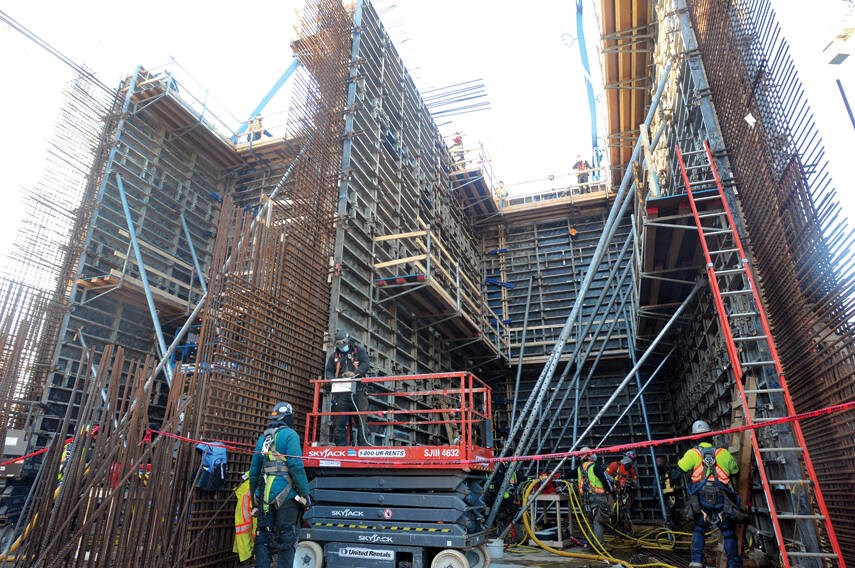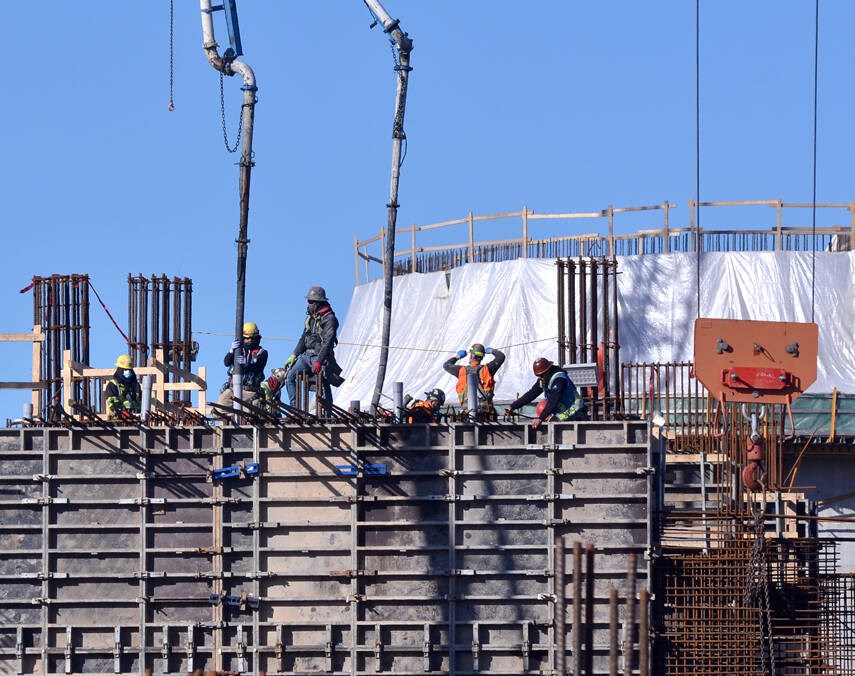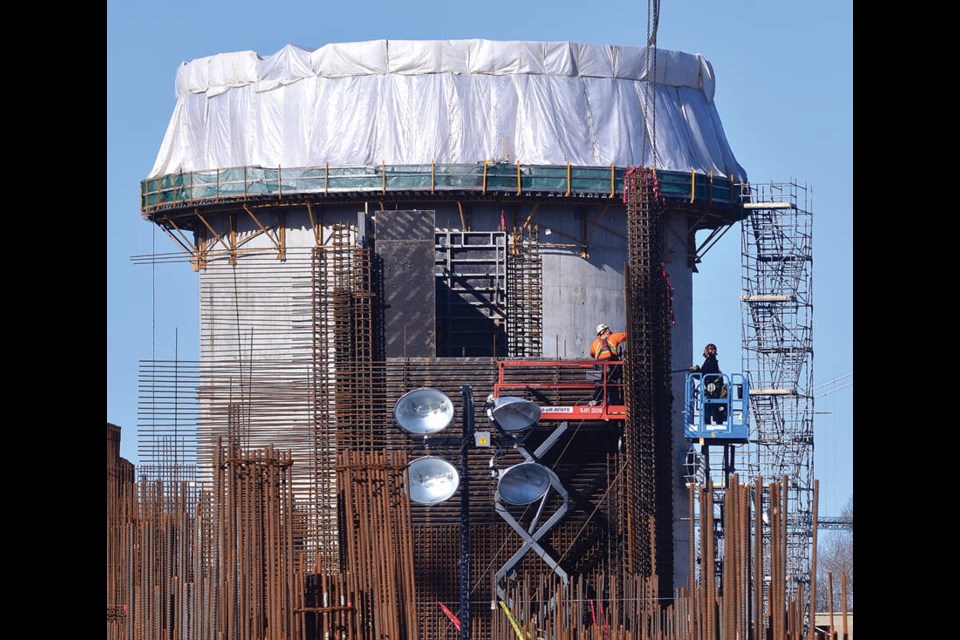It could cost another $85 million to fix work done so far on the North Shore’s beleaguered new sewage treatment plant, according to a Metro Vancouver staff report set to be discussed this week.
That’s in addition to $40 million approved by politicians last year to get the problem-plagued project back on track, and doesn’t even include the cost of finishing construction on the project, now several years behind schedule.
Increasing costs of the project are a potential worry for North Shore taxpayers, said District of North Vancouver Mayor Mike Little on Monday. “We’re obviously very concerned,” he said. “The North Shore municipalities have been contributing a significant portion through our utilities to this project.”
West Vancouver Coun. Christine Cassidy, who also sits on Metro’s liquid waste committee, said there’s reason to be concerned “at both the management and cost components of this project.” Cassidy said she’s hoping to get the North Shore governments together soon to discuss the financial impacts of the project and how best to get it completed, “as we bear the brunt of its rising costs.”
Problems with project worse than expected
A year ago, in February 2022, Metro Vancouver hired PCL Constructors Westcoast Inc. at a cost of $40 million to jump start construction on the stalled wastewater treatment plant.
PCL was to work with Metro staff to finalize a design and cost estimates for the partially constructed project, after Metro cut ties with its former contractor, Acciona, in the fall of 2021 over a contract dispute. PCL was also to complete some “early works” on the project by last summer.
But the report this week by Cheryl Nelms, Metro’s general manager of project delivery, indicates problems with the project are worse than first thought.
“PCL and AECOM have identified significant deficiencies” in the design and construction of the project, according to that report, “and in some cases, more extensive deficiencies than originally anticipated.”
Repair work is taking longer than planned because of “the high number of deficiencies” found in buildings already completed and “more challenging repair procedures required,” according to the report.
Nelms said while some of the problems were detected during construction, “the extent of the problem was not apparent until Metro Vancouver took over the site.”

Plant design questioned
There’s also a concern that Acciona’s existing design may not be able to provide tertiary treatment at the site as intended, said Little. “There are some concerns that that design has not been properly vetted,” he said. “These are very expensive challenges for us to overcome.”
In July 2019, Metro Vancouver politicians voted to upgrade the design of the plant to a tertiary level of treatment at an additional cost of $29 million, after pressure from North Shore environmental advocates.
Currently, the North Shore Wastewater Treatment Plant project is budgeted for just over $1 billion, including the cost of the treatment plant, the large pipe that will take treated sewage to the outfall, and a preliminary design for decommissioning the existing Lions Gate plant.
Adding $85 million to the PCL contract can be done within that overall budget, according to the staff report.
A year ago, the regional government estimated it had spent $498 million on the project so far. Metro was to have updated budget estimates for the project in the fall of 2022, but that has now been delayed to "mid-2023" according to Nelms.
The request to spend an additional $85 million on fixing work done so far and coming up with a revised timeline and project budget is set to be discussed today (March 15) by Metro’s liquid waste management committee.
Lawsuits filed
Meanwhile, several lawsuits connected to the project have already been filed.
In March 2022, Acciona filed a $250 million civil claim against Metro Vancouver for wrongful termination, unpaid costs related to the project, as well as lost profits and lost opportunity as a result of "diminished reputation" caused by Metro ending the contract. Metro Vancouver then filed a lawsuit against Acciona in July, alleging the company is responsible for $500 million in cost overruns. In December, Coquitlam Mayor Richard Stewart and then-city manager Peter Steblin were also named in a court petition by Metro Vancouver, alleging that confidential information about the project discussed in a closed-door meeting was leaked to Acciona through Steblin’s daughter, a former Acciona employee. Steblin has since retired.
None of the allegations in any of the lawsuits has been proven in court.
Little said also lurking in the political backdrop are implications for how the rebuild of Metro’s much larger Iona sewage treatment plant will be funded.

Utility fees could double in under five years
The North Shore project started as in which the contractor was required to design, build and finance the plant, said Little, with the idea that it would mitigate financial risk to the public. “I think some of the views have changed on that,” he said. “Particularly on very large, major pieces of infrastructure.”
The North Shore’s annual utility fees per household are now projected to climb to almost $1,270 annually by 2027, a massive spike as the region races to replace costly and aging infrastructure, including three new sewage treatment plants. Of that, North Shore households are forecast to be paying $826 towards liquid waste services by 2027, an increase of more than 93 per cent over the amount being paid in 2023. That amount is forecast to be between $150 and $350 more per year than households in other areas of Metro Vancouver will be paying for sewage service.
Households in other areas of the Lower Mainland will also see their utility bills go up significantly in the next four years, with the costs of paying for sewage treatment a primary driver of those increases. Total utility bills are forecast to be between $909 and $1,116 annually by 2027.



